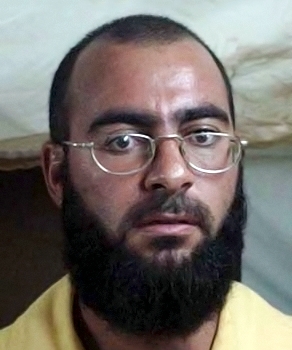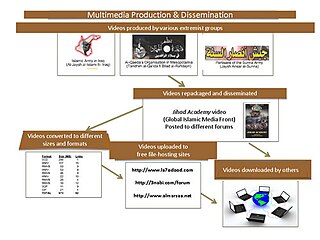Related Research Articles

Al-Qaeda is a Sunni pan-Islamist militant organization led by Salafi jihadists who self-identify as a vanguard spearheading a global Islamist revolution to unite the Muslim world under a supra-national Islamic state known as the Caliphate. Its members are mostly composed of Arabs, but also include other peoples. Al-Qaeda has mounted attacks on civilian and military targets in various countries, including the 1998 United States embassy bombings, the 2001 September 11 attacks, and the 2002 Bali bombings; it has been designated as a terrorist group by the United Nations Security Council, the North Atlantic Treaty Organization (NATO), the European Union, and various countries around the world.

Ansar al-Islam in Kurdistan, simply called Ansar al-Islam, also nicknamed the Kurdish Taliban, is a Kurdish Islamist militant and separatist group. It was established in northern Iraq around the Kurdistan Region by Kurdish Islamists who were former Taliban and former Al-Qaeda members, coming back from Afghanistan, in 2001. Its motive is to establish an Islamic state around the Kurdistan region and to protect Kurdish people. It imposed strict Sharia in villages it controlled around Byara near the Iranian border. Its ideology follows a traditionalist interpretation of the Quran and Salafism.
The Triple Frontier is a tri-border area along the junction of Argentina, Brazil and Paraguay, where the Iguazú and Paraná rivers converge. Near the confluence are the cities of Puerto Iguazú (Argentina), Foz do Iguaçu (Brazil) and Ciudad del Este (Paraguay). This area is near Iguazú Falls and the Itaipú hydroelectric plant.

Jamaat Ansar al-Sunnah, also known as Jaish Ansar al-Sunna, Ali ibn Abi Talib Battalion or simply as Ansar al-Sunnah was an Iraqi Sunni insurgent group that fought against US troops and their local allies during the Iraq War. The group was primarily based in northern and central Iraq, and included mostly Iraqi fighters. In 2007, it split into two groups; with its Kurdish members creating a group called Ansar al-Islam, and its Arab members creating a group called Ansar al-Sunnah Shariah Committee, before changing its name to Ansar al-Ahlu Sunnah in 2011.
The Moroccan Islamic Combatant Group, known by the French acronym GICM, is a Salafi jihadist terrorist organisation affiliated with Al-Qaeda. The GICM is one of several North African terrorist franchises spawned in Afghanistan during the tenure of the Taliban. The organisation and its associated members have been linked to major terrorist attacks including the 2003 Casablanca bombings that killed 33 people and wounded more than 100, and the 2004 Madrid train bombings that killed 191 people and wounded over 2,000. A crackdown against the organisation's numerous cells in Europe is thought to have since significantly damaged the GICM's capabilities.

Islamic terrorism refers to terrorist acts with religious motivations carried out by fundamentalist militant Islamists and Islamic extremists.
This article is a chronological listing of allegations of meetings between members of al-Qaeda and members of Saddam Hussein's government, as well as other information relevant to conspiracy theories involving Saddam Hussein and al-Qaeda.
Hezbollah has a Foreign Relations Unit and maintains relations with a number of foreign countries and entities. These are particularly Shia states, but also Sunni groups like those affiliated with the Palestinian cause; and the group is also suggested to have operations outside the Middle East in places such as Latin America and North Korea.

The Islamic State (IS), also known as the Islamic State of Iraq and the Levant, Islamic State of Iraq and Syria, and by its Arabic acronym Da'ish or Daesh, is a militant Islamist group and former unrecognized quasi-state that follows the Salafi jihadist branch of Sunni Islam. It was founded by Abu Musab al-Zarqawi in 1999 and gained global prominence in 2014, when it drove Iraqi security forces out of key cities during the Anbar campaign, which was followed by its capture of Mosul and the Sinjar massacre. The organization significantly revamped the course of the Syrian civil war when it announced its expansion into Syria in mid-2013 and began conducting ground attacks against both Syrian government forces and Syrian opposition militias. By the end of 2015, it held an area that contained an estimated eight to twelve million people and stretched from western Iraq to eastern Syria, where it enforced its interpretation of Islamic law. ISIL was estimated at the time to have an annual budget of more than US$1 billion and more than 30,000 fighters.
Since the Iranian Revolution in 1979, the government of Iran has been accused by several countries of training, financing, and providing weapons and safe havens for non-state militant actors, such as Hezbollah in Lebanon, Hamas in Gaza, and other Palestinian groups. These groups are designated terrorist groups by a number of countries and international bodies; however, Iran considers such groups to be "national liberation movements" with a right to self-defense in the face of Israeli military occupation.
There have been several videos released showing Al-Qaeda leader Ayman al-Zawahiri.
Rita Katz is a terrorism analyst and the co-founder of the Search International Terrorist Entities (SITE) Intelligence Group, a private intelligence firm based in Washington, D.C.
Hamid bin Abdallah al-Ali has been described as "an influential Salafi cleric" based in Kuwait, whom the U.S. Treasury Department has described as "an Al Qaeda facilitator and fundraiser."

Abu Bakr al-Baghdadi, was an Iraqi militant and the first caliph of the Islamic State, who ruled as the dictator of its territories from 2014 until his death in 2019.
Terrorism, in some of its definitions, serves to communicate a message from terrorists to a target audience (TA). By extension, symbols play an important role in such communication, through graphics that the organizations use to represent themselves, as well as the meaning and significance behind their choice of targets.
Terrorism, fear, and media are interconnected. Terrorists uses the media to advertise their attacks and or messages, and the media uses terrorism events to further aid their ratings. Both promote unwarranted propaganda that instills mass amounts of public fear. Osama Bin Laden himself spoke of this weaponization of the media in a letter after 9/11. Within that letter, Bin Laden recalled fear as the deadliest weapon. He reflected upon the way western civilization has become obsessed with mass media in that they are quick to consume what will evidently bring them fear. He also states that, we are bringing this problem on our own people by giving the media such power. In relation to one’s need for media coverage, the Jihad can be classified as an offspring of mass media. The Jihad needs to conceptualize their martyrdom by leaving behind manifestos and live videos of their attacks. In fact, it is crucially important to them that it is being covered. For there is this overall fascination with crime itself, especially terrorism. The components the media looks for to deem the news “worthy” enough to publicize are categorized into ten qualities, terrorists usually exceed half in their attacks. The following are Immediacy, Conflict, Negativity, Human Interest, Photographability, Simple Story Lines, Topicality, Exclusivity, Reliability, and Local Interest. Morality and profitability often are two motivations when delivering news, however recently news has become more motivated in making money than shielding the public from bad news.

The Global Islamic Media Front (GIMF) is an Islamist propaganda organization that is associated with the terrorist group, al-Qaeda, and other jihadist groups. The GIMF is known by the U.S. Federal Bureau of Investigation (FBI) as an "underground media" organization. The GIMF specializes in production of jihadist material for distribution. It is one of several organizations that jihadists use to spread information via the Internet, including the well-known As-Sahab. Their slogan that is used on their materials is "Observing Mujahideen News and Inspiring the Believers." There is no indication who the leader of this organization is.

Abdulrahman Mustafa al-Qaduli, better known by his noms de guerre Abu Ala al-Afri and Abu Ali al-Anbari, was the governor for territories held by the Islamic State of Iraq and the Levant (ISIL) in Syria. Considered the ISIL second-in-command, he was viewed as a potential successor of ISIL leader Abu Bakr al-Baghdadi.
Terrorism in Brazil has occurred since at least the 1940s.

Al-Qaeda in the Sinai Peninsula, or AQSP, is an Egyptian militant jihadist organization possibly formed by a merger between al-Qaeda operatives in Sinai and Ansar al Jihad. It is Al-Qaeda's branch in the Sinai peninsula, and is composed of many Al-Qaeda factions in the area. Despite sharing similar ideology and possibly some resources, AQSP and the Islamic State have never formally affiliated with one another.
References
- ↑ Trevisi, A. F. "Assessing the terrorist threat in the Tri-Border area of Brazil, Paraguay and Argentina." International Institute for Counter-Terrorism. (2013).
- ↑ Nauta, Arjen. "Radical Islam, Globalisation and Social Media: Martyrdom Videos on the Internet¹." Margaret and Frank (2013): 121.
- ↑ Tavares, Rodrigo. "South America." Handbook of Governance and Security (2014): 228.
- ↑ Zaia, Sophia Luiza. "Autonomy and Foreign Policy: the Brazilian Case on the Fight Against Terrorism in the Lula administration." Meridiano 47-Journal of Global Studies 19 (2018).
- ↑ Robin Yapp (3 April 2011). "Brazil latest base for Islamic extremists". The Telegraph.